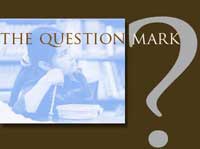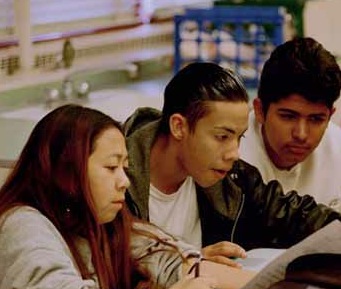| Research Cycle |
|
|
|
| Vol 9|No1|October|2012 | |
Election 2012 — What can you do?
Questions voters should ask
 |
|
||
When we consider candidates for any political office, questioning is essential. This article suggests a wide range of questions that might be applied to any politicians running for office in the USA, Australia, New Zealand or similar nations. |
|||
What are the traits of a good leader? of a good President? of a good Prime Minister? of a good Mayor?In order to make a smart choice — which is the skill EVALUATION on Bloom's Taxonomy — the voter (or student) must decide first what are the traits and characteristics of a good leader, especially for the job at hand. Once these are established, the voter forms telling questions that will help assess whether each candidate meets or fails to meet those criteria. Research is a matter of gathering data in response to those questions. For more than ten years, I have been using the choice of a ship captain to illustrate this thought process.
Who shall it be? By organizing essential and subsidiary questions prior to conducting research, students will be able to focus subsequent energy on pertinent information instead of gathering huge piles of information, much of which will contribute very little to the choice of a captain. First the students must determine the traits of a good captain and surround the central question with those concepts. For example:
For each trait, the students must list telling questions that would develop sufficient evidence to support making an informed judgment. Which captain had the most navigational skill? The students would have to find answers to questions like the following:
American teachers helping students to compare the current candidates for President might challenge their classes to come up with criteria that fit that elected office. What are the traits of a good President? The answers to this question will vary from voter to voter and from student to student, of course, but the thought process may be started as a group activity with each student eventually asked to work on a personal version. The teacher leads the class in identifying 4-5 fairly generic criteria like those shown below.
Students are then asked to work alone or in like-minded groups to come up with another half dozen criteria. Their political beliefs and attitudes may strongly influence their choices of criteria. Some students will want the national government to take a strong role in fixing problems, for example, while others may want a President who cuts spending and the size of government. Some students may be worried about poverty and social justice, while others may want a President who concentrates on building a strong military and leaves poverty to charities and churches. Some students may fear that the American government is violating civil liberties in its attempts to track down terrorists here and abroad, while others may feel the FBI and the CIA have not done enough. Using a mind map like those created on Inspiration™ or Smart Ideas™ they add their personal criteria to the mind map shown above.
The teacher then leads the class in developing telling questions for one of the least controversial of the criteria first listed. Experienced? The teacher might pick "experienced" for a group attempt at listing telling questions. "What are the questions we might ask," she says, "to find out if a candidate has the kind of experience that would prepare him or her to lead our nation?" The room may be quiet at first and many of the students will seem puzzled. If this is the case, then the teacher may give some examples. "How about we ask if the candidate ever served in the military?" she says. The class nods agreement, though a few seem uncomfortable with this one. "If you do not like some of these," she says, "you don't have to include them in your mind map. We are just doing this so you get the idea." One student suddenly has an idea and blurts out, "Has he ever been a governor?" "What do you think, class? is that a good one?"
The class seems divided, as some know that candidate Romney has been a governor while candidate Obama has not been a governor. A different student chimes in, "That's like asking if he has been a Senator!" she says. "Wouldn't it be better to ask what elected positions the candidates have held?" As the class seems more comfortable with this question, the teacher adds it to the list on her computer projected on the room's screen. "Others?" she prompts. "How about business?" suggests one student. "Can you turn that into a question?" the teacher asks. The student pauses and struggles but finally tries . . . "What kinds of jobs has he held in business?" The girl who complained about the governor question jumps in once again. "That's loaded!" she argues. Reagan has been a business guy but Obama has not. The boy is quick to argue back. "That's the point. Don't we want leaders who have run a company and shown a profit?" Others are getting fired up by what is becoming a controversy. "Run a company and sent American jobs overseas? Fired lots of workers?" At this point the teacher steps in and stops the argument. "Congratulations," she says with a big smile. "You just showed why the mind map ends up being personal. That's not a bad thing at all. Each of you can decide if you care more about business experience than public service as a criterion for selecting a President. Now that you understand the idea and purpose of telling questions, go back into your mind maps and generate a half dozen for each of your criteria."
Gathering the Data Once the students have sketched out their telling questions, the teacher will conference with each student or team of students to make sure they have not neglected important issues. Even though the activity will leave lots of room for personal belief and philosophy, the inquiry should be comprehensive. The teachers review is an important check point along the research path to improve the quality and thoroughness of the process. As students begin to collect data in answer to their telling questions, they must store their findings in the mind map in a manner that will lead to coherence. This not about big piles that have been copied and pasted. They are gathering just the "right stuff" — data that is directly pertinent to the question being asked — and they are placing the data with that question. Coherence provides the ties that bind information For an extensive article explaining the importance of coherence, you might enjoy reading "The Ties that Bind and the Links that Set Us Free" Copyright Policy: Materials published in The Question Mark may be duplicated in hard copy format if unchanged in format and content for educational, nonprofit school district and university use only and may also be sent from person to person by email. This copyright statement must be included. All other uses, transmissions and duplications are prohibited unless permission is granted expressly. Showing these pages remotely through frames is not permitted. FNO Press is applying for formal copyright registration for articles.
|
|||






